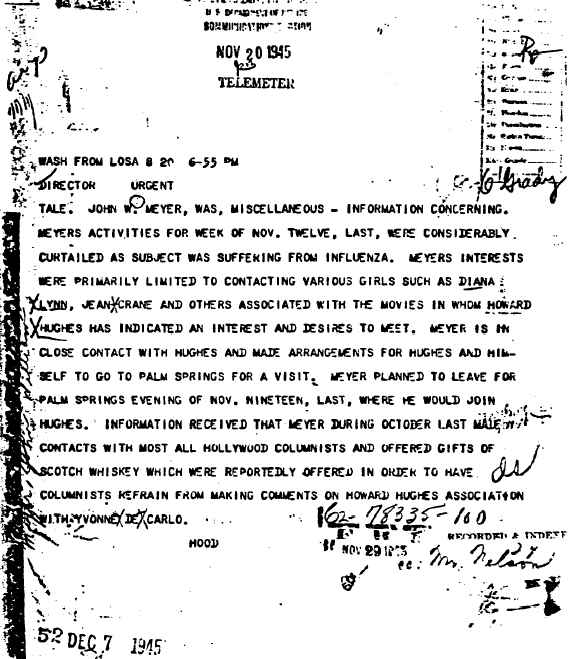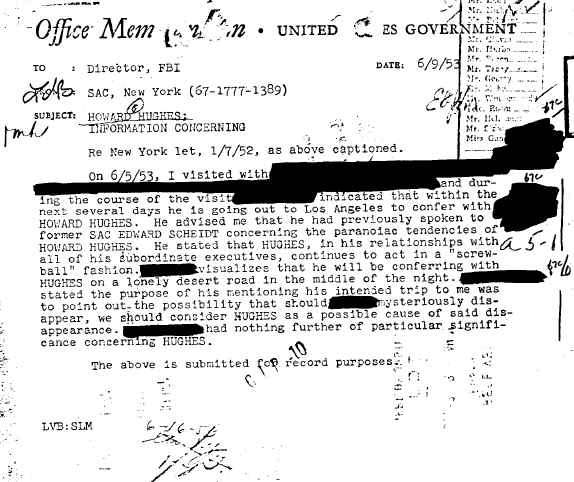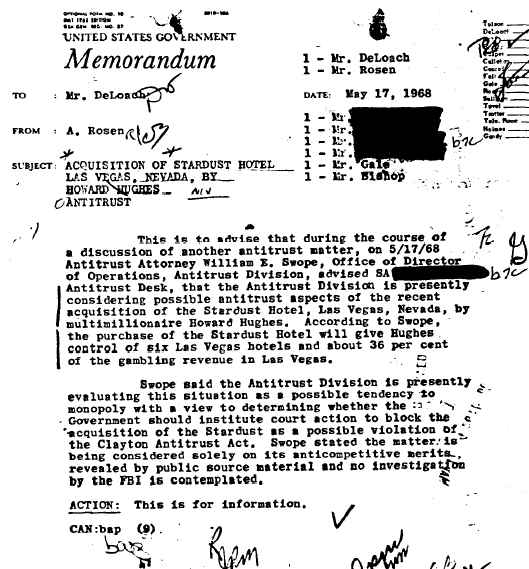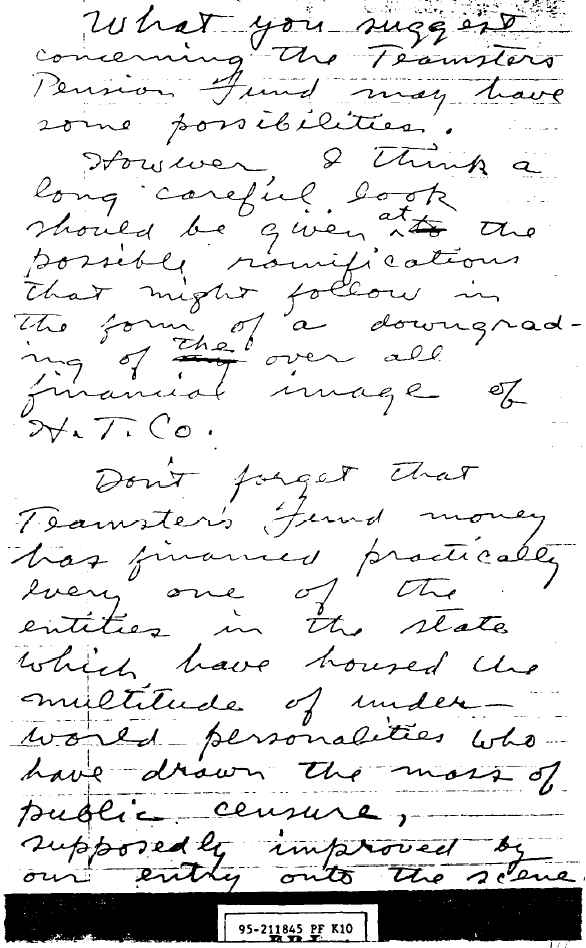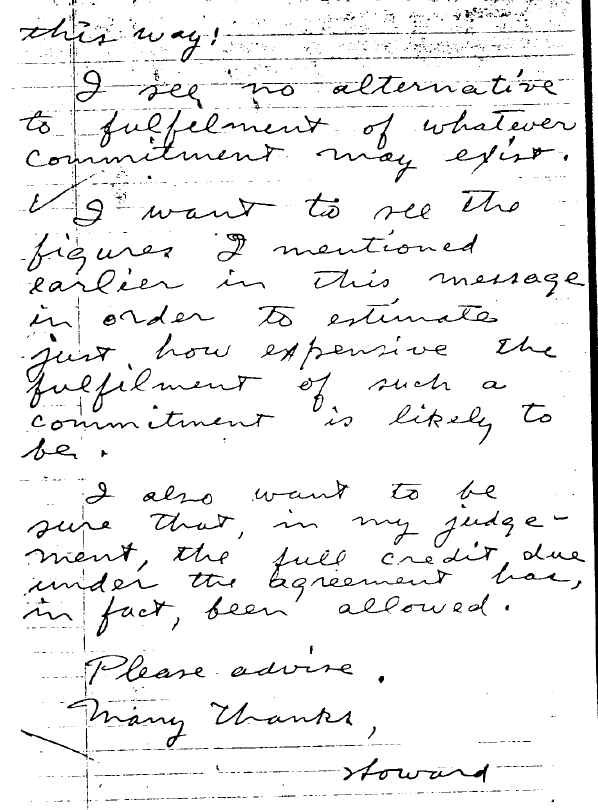|
Howard Hughes FBI Files
2,285 pages of Howard Hughes FBI files.
Howard Robard Hughes, Jr. was born in Houston, Texas, in December 1905, to a wealthy family. Orphaned at 17, he dropped out of school to take control of the family business, the Hughes Tool Company, which had made a fortune thanks to a patent it held for a special oil-drilling bit. Although Howard Hughes maintained control of the company, he quickly set out for Los Angeles to pursue two main goals, to become a famous movie producer and the world's best pilot.
Howard Hughes combined certain aspects of his two dreams when he produced and directed the movie Hell's Angels (1930), a romantic vision of World War I aviators. The film took three years to make, cost $3.8 million to produce, and killed three pilots in the process. It also received an Academy Award nomination for Best Cinematography. During filming, Hughes obtained his pilots license. To make the film he purchased the largest private air force, accumulating 87 vintage Spads, Fokkers and Sopwith Camels. Hughes directed the aerial combat scenes filmed over Mines Field, now the location of Los Angeles International Airport. Hughes also crashed during the filming and was pulled unconscious from his plane. Parts of the film had to be re-shot, due to the increasing popularity of talking pictures. The film was not able to recoup at the box office its $3.8 million price tag, the most expensive film produced up to that point. Two of his later films Scarface (1932) and The Outlaw (1941) were both censored due to their controversial content.
To support his aviation ventures, Howard Hughes created the Hughes Aircraft Company in Glendale, California in 1932. The company consisted initially of Hughes' own small team of designers and mechanics. Howard Hughes was hailed as the second Charles Lindbergh, at one time holding every significant aviation speed record. In 1939, Hughes became the principal stockholder of TWA (then Transcontinental & Western Air, Inc.). He had a hand in the design and financing of both the Boeing Stratoliner and the Lockheed L-049 Constellation, which he acquired for TWA. When the Constellation was ready for its test flight in 1944, Hughes dressed the plane in TWA's signature red and flew it non-stop cross country in under seven hours, breaking his own 1937 transcontinental speed record. Although regular flights would not be non-stop, the Constellation marked an advance in regularly scheduled cross-country passenger service, cutting about eight hours off the trip. During the Second World War, Hughes Aircraft grew from a four-person operation into an 80,000-employee giant. Howard Hughes created Hughes Electronics as a division of Hughes Aircraft, and the new division became the single largest supplier of weapons systems to the U.S. Air Force and Navy.
In 1966 Howard Hughes moved to Las Vegas. By this time his decent into mental illness, reclusiveness, and drug addiction was well underway. When the Desert Inn threatened to evict him, he bought the hotel. Hughes also became the owner of Castaways, New Frontier, Landmark, Sands and Silver Slipper. Hughes' investments in Las Vegas is credited with moving control and ownership of hotels and casinos in Las Vegas from mobsters to corporate entities.
Although Howard Hughes set several air speed and distance records in his early years followed, those accomplishments were overshadowed in his later years by his poor business decisions, his attempts to manipulate the military aircraft market, and his personal eccentricities and reclusiveness. Still, in spite of some of his unscrupulous actions late in life and his eccentric and reclusive personality, he was in many ways is seen by many as a romantic figure, and his aviation career, at least in the beginning, reflected his great love of the aviation.
Despite suffering four plane crashes while testing his own aircraft during his career, Hughes ironically died as a passenger on a jet plane on April 5, 1976, while en route to receive medical treatment after years of self-neglect. X-rays taken during Hughes' autopsy showed dozens of broken off needles in his arms and legs. Four-hundred people claimed to be heirs to Hughes' fortune. The most famous being Melvin Dummar.
Melvin Dummar's September 11, 1975 appearance on the TV game show "Let's Make A Deal" did not lead to much gain, but his 1977 claim would have brought him $156 million. A will, which came to be known as the "Mormon Will", was mysteriously found on the desk of an official of The Church of Jesus Christ of Latter-day Saints in Salt Lake City. The will stated that 1/16th of his estate would go to Melvin Dummar. Dummar claims that in 1967 he was on his way to California to find his wife, who had runaway with another man. Dummar says he found a disheveled and dirty man laying off a remote Nevada road, 150 miles north of Las Vegas, near the Cottontail Ranch, a legal brothel.
Dummar says the man asked him to take him Las Vegas. Dummar says he dropped the man off at the Sands Hotel as the man requested. Dummar says the man claimed to be Howard Hughes, but that he did not believe him. Dummar's story was turned into the 1980 film "Melvin and Howard." The money Dumar made from the film went toward his legal bills. Howard Hughes' estate eventually was divided up between his 22 cousins.
The files date from 1943 to 1981.
Highlights from the files include: Memos showing that the FBI had Hughes under close scrutiny during 1945 and 1946. The memos would appear to show that someone close to Hughes was providing information to FBI on nearly a daily basis during this time, including minutia such as the amount of hotel bills incurred by Hughes' business associates. The FBI produced memos listing the names of actresses that Hughes had the desire to get to know better. Memos show an FBI investigation into the wiretapping of Hughes by Congressional investigators. Memos chronicle the onset of Hughes' peculiar behavior. Files contain photocopies of letters handwritten by Hughes. Much attention is given to Hughes' 1970 disappearance. Files includes memos and FBI lab reports dealing with the investigation of the "Mormon Will" and Melvin Dummar.
|
|
